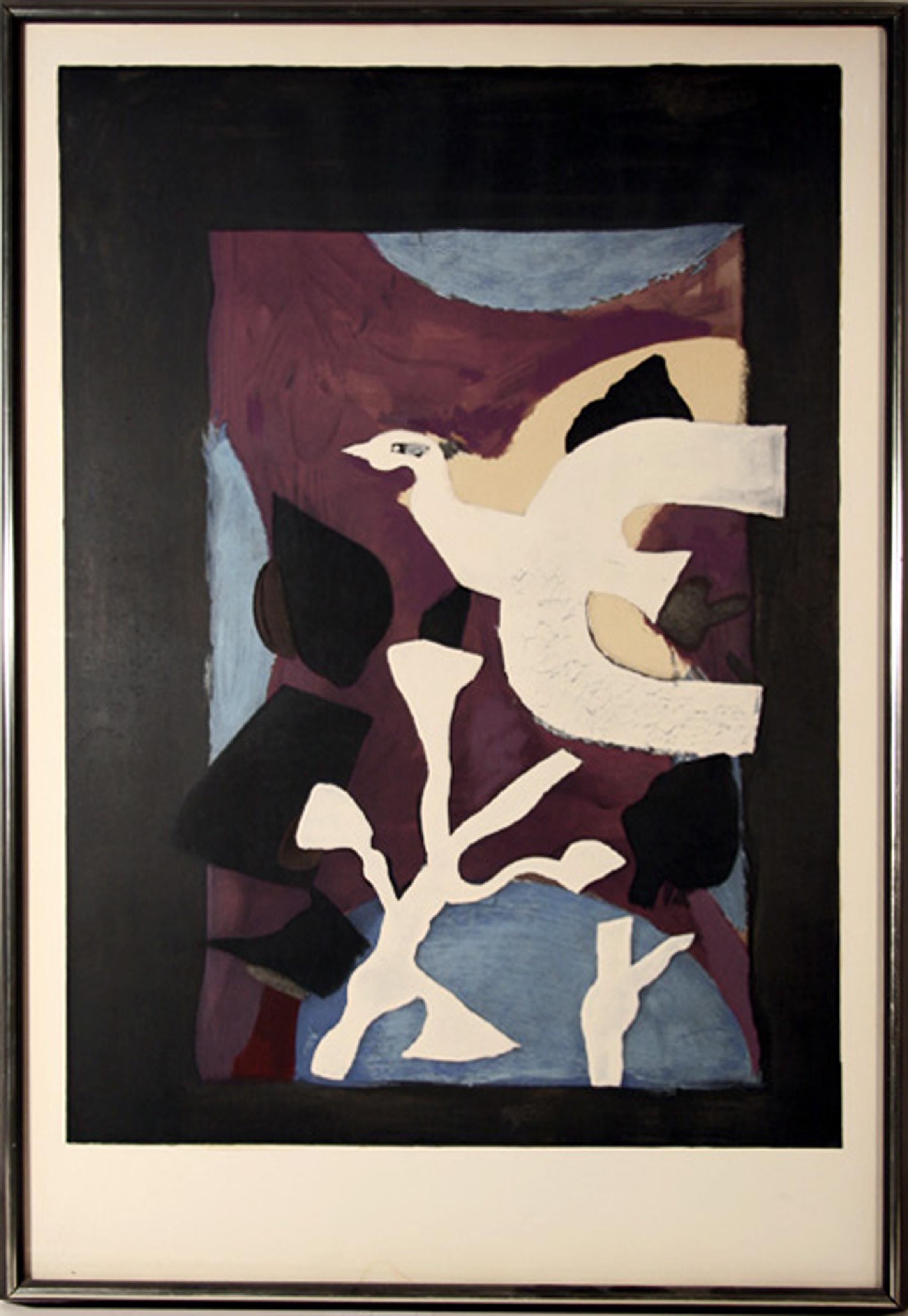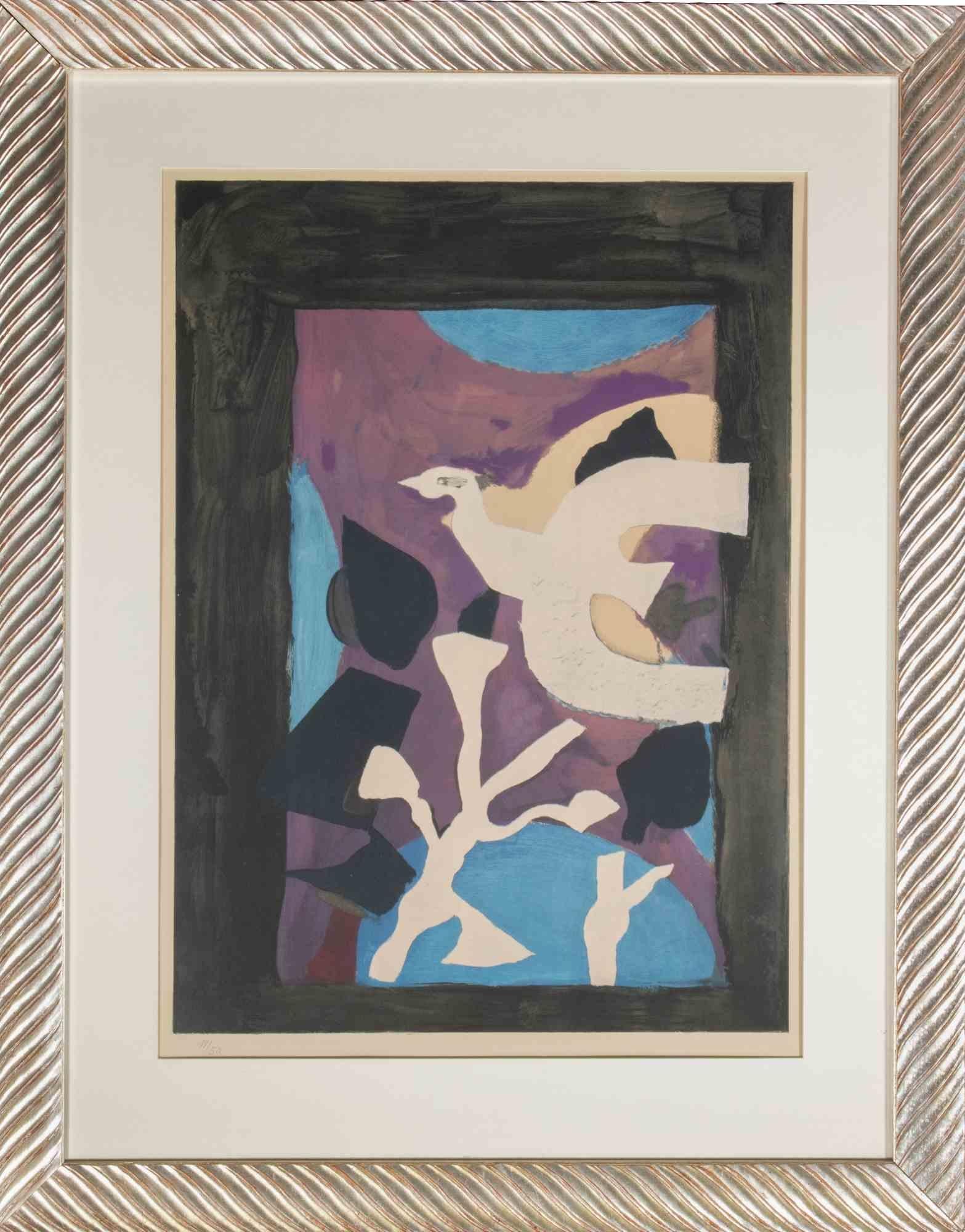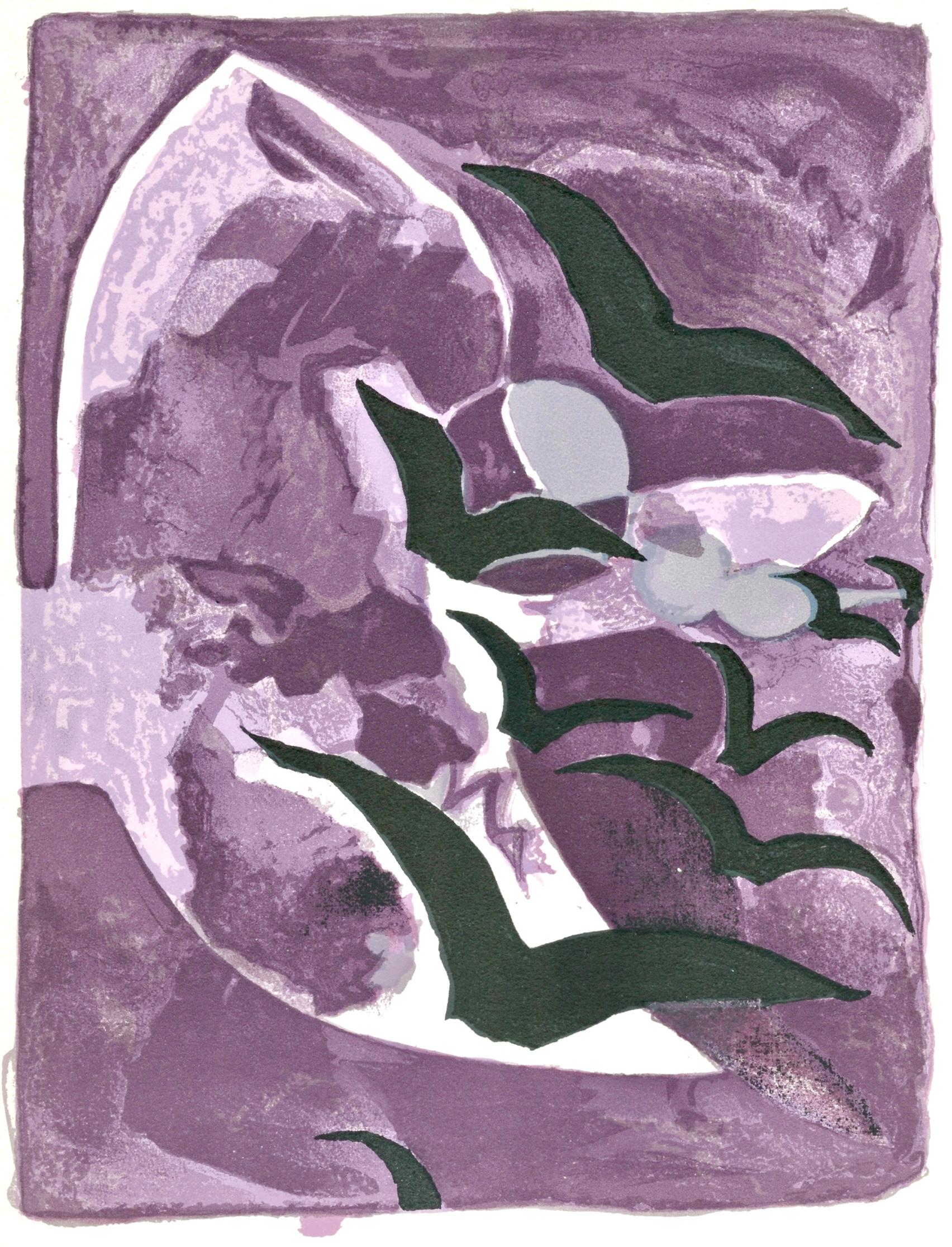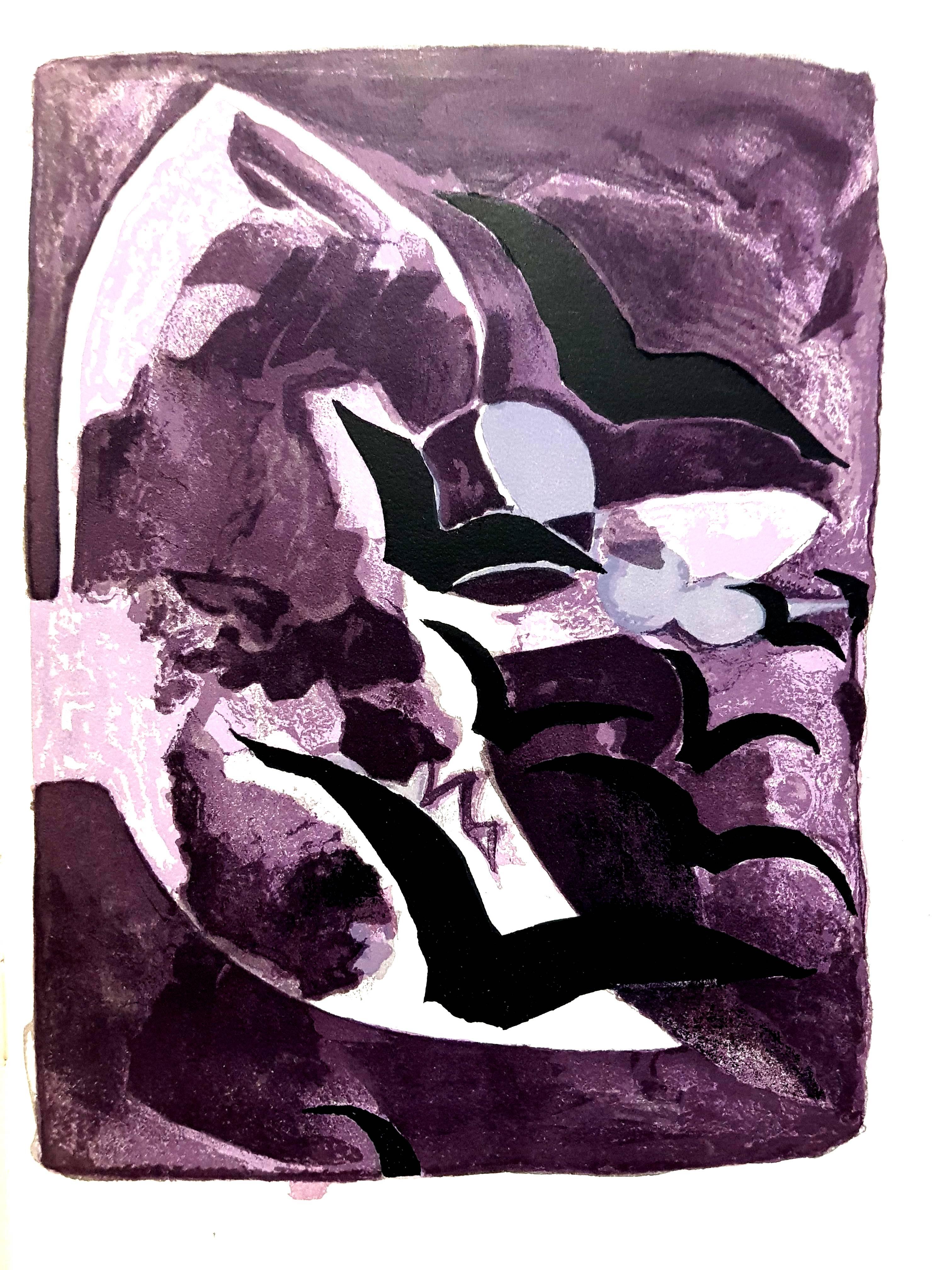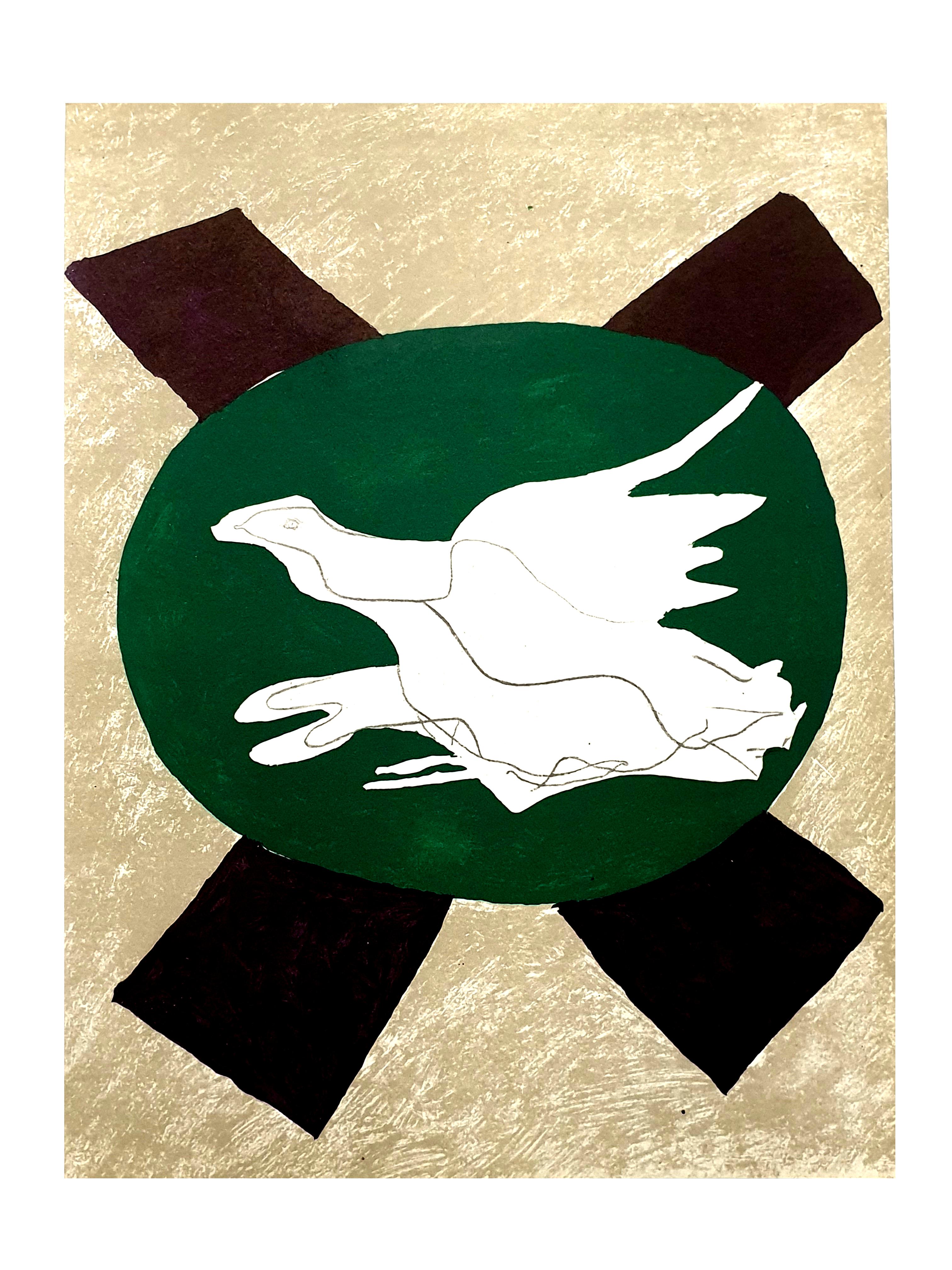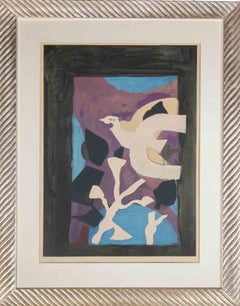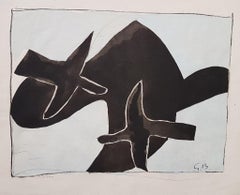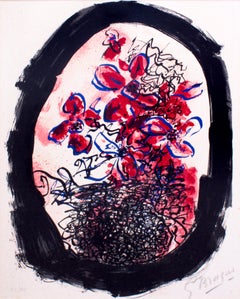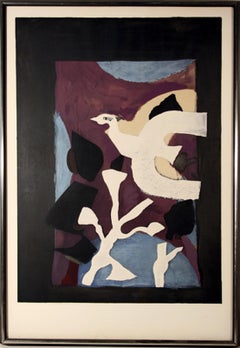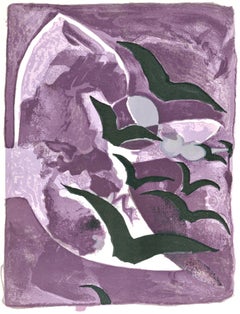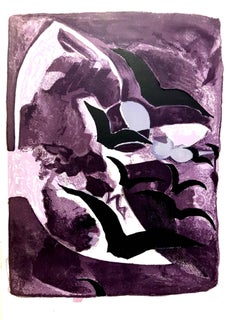Items Similar to Oiseaux - Lithograph after Georges Braque - Mid-20th Century
Want more images or videos?
Request additional images or videos from the seller
1 of 5
Oiseaux - Lithograph after Georges Braque - Mid-20th CenturyMid-20th Century
Mid-20th Century
$952.95
£713.60
€800
CA$1,328.11
A$1,456.61
CHF 761.78
MX$17,599.89
NOK 9,558.14
SEK 9,009.70
DKK 6,090.23
About the Item
Oiseaux is an lithograph realized by an anonymous artist after Georges Braque in the 20th Century.
Printed by Mourlot. Good conditions.
The artwork depicts abstract forms of birds within a stylized landscape. Sharp contrast between dark and light forms of flat colors within a well-balanced composition.
- Creation Year:Mid-20th Century
- Dimensions:Height: 27.56 in (70 cm)Width: 19.3 in (49 cm)Depth: 0.08 in (2 mm)
- Medium:
- Movement & Style:
- After:(after) Georges Braque (1882 - 1963, French)
- Period:
- Framing:Framing Options Available
- Condition:Insurance may be requested by customers as additional service, contact us for more information.
- Gallery Location:Roma, IT
- Reference Number:Seller: T-1254111stDibs: LU65039080852
About the Seller
4.9
Platinum Seller
Premium sellers with a 4.7+ rating and 24-hour response times
1stDibs seller since 2017
7,711 sales on 1stDibs
Typical response time: 2 hours
- ShippingRetrieving quote...Shipping from: Roma, Italy
- Return Policy
Authenticity Guarantee
In the unlikely event there’s an issue with an item’s authenticity, contact us within 1 year for a full refund. DetailsMoney-Back Guarantee
If your item is not as described, is damaged in transit, or does not arrive, contact us within 7 days for a full refund. Details24-Hour Cancellation
You have a 24-hour grace period in which to reconsider your purchase, with no questions asked.Vetted Professional Sellers
Our world-class sellers must adhere to strict standards for service and quality, maintaining the integrity of our listings.Price-Match Guarantee
If you find that a seller listed the same item for a lower price elsewhere, we’ll match it.Trusted Global Delivery
Our best-in-class carrier network provides specialized shipping options worldwide, including custom delivery.More From This Seller
View AllOiseau et Lotus - Lithograph by Georges Braque - 1963
By Georges Braque
Located in Roma, IT
Oiseau et Lotus is a color lithograph on paper, realized by the French Cubist artist, Georges Braque (1882-1963).
Printed by ARTE in 1963 by order of Galerie Maeght in Paris in a ci...
Category
1960s Modern Abstract Prints
Materials
Lithograph
The Black Birds - Lithograph After Georges Braque - 1958
By (after) Georges Braque
Located in Roma, IT
The Black Birds is a lithograph published by Maeght after an original composition by Georges Braque in 1958. Braque authorized and selected certain works to be reproduced by his tru...
Category
1950s Contemporary Abstract Prints
Materials
Lithograph
$5,539 Sale Price
25% Off
Frontispiece from Braque Lithographe - Lithograph 1961
By Georges Braque
Located in Roma, IT
Hand signed and numbered.
Edition of 125 prints.
Ref.: Catalogue D.Vallier pag.284
Passepartout included : 69 x 49 cm
Very good conditions.
Georges Braque
(Argenteuil, 1882 – Paris...
Category
1960s Modern Figurative Prints
Materials
Lithograph
Le Repos - Original Lithograph After G. Braque - 1967
By (after) Georges Braque
Located in Roma, IT
Le Repos is an original lithograph realized by Georges Braque (After) (Argenteuil, 1882 - Paris, 1963) in 1967.
Original Lithograph on paper.
Published by Maeght Editeur, Paris. Credits printed on rear.
Mint Conditions.
Georges Braque (1882-1963) was a French Fauve painter who began to rethink his own painting style after admiring Picasso’s Les Demoiselles...
Category
1960s Fauvist Still-life Prints
Materials
Lithograph
Composition from Derriere Le Miroir - Lithograph after George Braque - 1964
By George Braque
Located in Roma, IT
Composition from Derriere Le Miroir is a splendid lithograph realized after George Braque in 1964
The artwork is from Derriere Le Miroir. La Fondation Marguerite et Aimè Maeght, n.148. Printed by Ateliers de Maeght, Paris, 1964
Special issue of the magazine, published on the occasion of the inauguration of the Marguerite et Aimé Maeght Foundation...
Category
1960s Fauvist Abstract Prints
Materials
Lithograph
Migration - Etching by Georges Braque - 1962
By Georges Braque
Located in Roma, IT
" Migration " is an etching realized by Georges Braque in 1962. The print is hand signed and numbered. This is an edition of 90 prints.
Bibliography: D. Vallier, Braque : l'oeuvre gravé: catalogue raisonné , Flammarion, Paris 1982, p.241, n.72.
Georges Braque (1882-1963) was a French Fauve painter who began to rethink his own painting style after admiring Picasso’s Les Demoiselles...
Category
1960s Cubist Animal Prints
Materials
Etching
You May Also Like
Derniers Messages, Cubist Lithograph by Georges Braque
By Georges Braque
Located in Long Island City, NY
Georges Braque, French (1882 - 1963) - Derniers Messages, Year: circa 1965, Medium: Lithograph, Image Size: 23.5 x 17 inches, Frame Size: 28 x 19.5 inches
Category
1960s Cubist Animal Prints
Materials
Lithograph
Braque, Les oiseaux de nuit, Prints from the Mourlot Press (after)
By Georges Braque
Located in Southampton, NY
Lithograph on vélin d'Arches paper. Paper Size: 10 x 7.5 inches. Inscription: Unsigned and unnumbered, as issued. Notes: From the album, Prints from the Mourlot Press, exhibition spo...
Category
1960s Cubist Abstract Prints
Materials
Lithograph
$716 Sale Price
20% Off
Free Shipping
Black Birds - Lithograph - 1956
By (after) Georges Braque
Located in Paris, IDF
(after) Georges Braque, (1882 - 1963)
Les Oiseaux Noirs (Black Birds), 1956
Lithograph
Printed in Jacomet workshop
On vellum 40 x 48 cm (c. 16 x 19 inc...
Category
1950s Cubist Figurative Prints
Materials
Lithograph
After Georges Braque - Les oiseaux de nuit - Lithograph
By Georges Braque
Located in Collonge Bellerive, Geneve, CH
Georges Braque - Les oiseaux de nuit
Lithograph after the gouache
1964
Dimensions: 30 x 20 cm
Edition of 200 (one of the 200 on Vélin de Rives)
Mourlot Pre...
Category
1960s Modern Abstract Prints
Materials
Lithograph
Georges Braque - Birds - Original Lithograph
By Georges Braque
Located in Collonge Bellerive, Geneve, CH
Georges Braque - Birds - Original Lithograph
Published in the deluxe art review, XXe Siecle
1958
Dimensions: 32 x 24 cm
Publisher: G. di San Lazzaro.
Unsigned and unumbered as issued
Category
1950s Modern Figurative Prints
Materials
Lithograph
Three Birds, Cubist Lithograph Poster after Georges Braque
By Georges Braque
Located in Long Island City, NY
Georges Braque, After, French (1882 - 1963) - Three Birds, Year: circa 1960, Medium: Lithograph Poster, Image Size: 34.5 x 23 inches, Size: 37 x 25.5 in. (93.98 x 64.77 cm), Prin...
Category
1960s Cubist Animal Prints
Materials
Offset, Lithograph
More Ways To Browse
Jan Grotenbreg
Janice Rogers
Japanese Exhibition Poster
Japanese Street Art
Jewish Prayer Art
John Finch
Joyce Moore
Judith Light
Katerina Skasi
Kaws Companionship In The Age Of Loneliness
Kaws The Promise
Keith Haring Paris
Leningrad Poster
Massacre Of The Innocents
Matisse Goldfish
Maxims Paris
Minerva Painting
Miro Osaka
